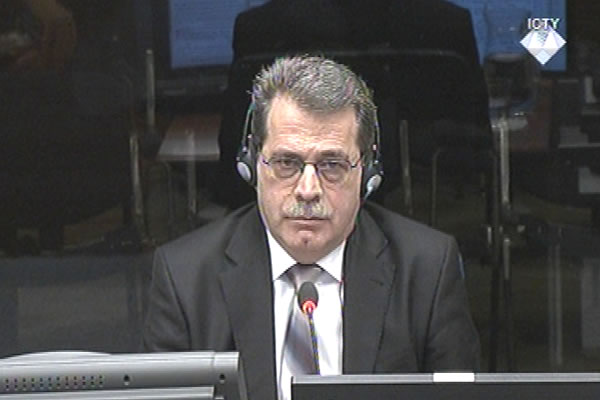Home
‘SILK ROPE FOR ALIJA’
Through witness Ostoja Barasin, Ratko Mladic’s defense tendered into evidence two documentaries Barasin directed. In the cross-examination, the prosecutor was more eager to learn what the witness knew about the crimes against non-Serbs. He also questioned Barasin about the contents of the documents the VRS had distributed to the soldiers, including Milan Gvero’s article entitled Silk Rope for Alija
 Ostoja Barasin, defence witness at Rako Mladic trial
Ostoja Barasin, defence witness at Rako Mladic trial After Momir Deuric completed his evidence in the morning, the trial of Ratko Mladic continued with the testimony of Ostoja Barasin, former chief of the Information Department in the VRS 1st Krajina Corps. The department’s task was to keep the public informed about the events in the Corps area of responsibility, and to receive domestic and foreign journalists who were covering the conflict.
Barasin made two documentaries that were admitted into evidence as defense exhibits, without being showed in the courtroom. The film Rat Line is about the action to prevent the Berbir, a Muslim group, from setting up a beached on the Sava River which would have allowed the troops to infiltrate BH from Croatia. The other movie, Genocide Again, was dedicated to the Serb victims in Kupres, Derventa, Brod, the village of Serdari and other places in Northern BH in 1992.
In the cross-examination, prosecutor Arthur Thraldi wanted to learn if the witness knew about the crimes of the Serb forces in his area of responsibility. He asked Barasin about his knowledge of the incident in which25 Muslim detainees were killed in Vrhpolje near Sanski Most. The witness replied that he learned about the crime from the media. Asked about the prison camps run by the Serb army,the witness said that the term ‘prison camp’was ‘used too facilely, with the exception of Manjaca’, to describe any site where ‘several people were held in detention for a few of days’.
When the witness was warned to refrain from making‘general statements’, he explained that he knew nothing about what had happened in Betonirka, one of the prison facilities in Sanski Most. In July or August 1992, the witness explained, he went to Trnopolje with a group of journalists and saw that people were ‘free to come in and go out’. Also, the witness confirmed that both the army and the police secured the Trnopolje prison camp. They were there, the witness explained, to protect non-Serbs against attacks by Serb individuals.
Prosecutor Traldi confronted the witness with the texts published in the VRS bulletins, The Krajina Soldier and the Serb Army. The articles were used to raise the awareness and combat morale of the Serb fighters by invoking ‘remembrance’of Serb suffering at the hands of Croats and Muslims. The prosecutor quoted parts of an article written by Milan Gvero, Mladic’s assistant for moral education, legal and religious issues. Gvero warned of the dangers the Serbs faced from ‘Ustasha knives and pits’, from the ‘Turkish oppression’and ‘converts to Islam’. In the article Gvero stressed that Serbs should ‘fight or disappear’. In the prosecutor’s view, the verytitle of the article–Silk Rope for Alija –‘called for the use of assassination methods common in the Middle Ages’. The witness insisted that Gvero merely warned that ‘Alija’s policies will lead to such consequences’.
Linked Reports
- Case : Mladic
- 2014-11-20 MLADIC’S WITNESS: MASSACRE IN VELAGICI ‘REVENGE FOR WORLD WAR II’
- 2014-11-19 ‘SELF-ORGANIZED’ SERB GUARDS IN ROGATICA
- 2014-11-19 MAKING MUSLIMS FEEL LIKE THEY LIVED ‘IN A GHETTO’
- 2014-11-25 EVACUATION ALLOWED, RETURN PROHIBITED
- 2014-11-26 NO NEED TO LIST CRIMES AGAINST NON-SERBS BECAUSE THEY WERE 'GENERAL KNOWLEDGE'
- 2014-11-27 PRAISE FOR ‘COURAGEOUS AND FAIR’ GENERAL MLADIC
